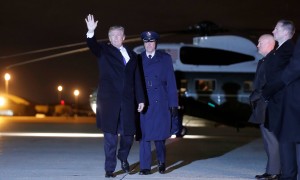导读:中国因不满韩国萨德部署,限制韩国明星在中国的发展。韩流会变成“寒”流吗?

Claims that programs involving South Korean stars would be blocked from being made or broadcast in China have come under the spotlight of some overseas media, South Korean media in particular. Suspicion is swirling that it’s related to Beijing’s discontent with Seoul’s decision to deploy the Terminal High Altitude Area Defense (THAAD )system. Some local TV stations of China reportedly have received instructions from regulators.
传言,中国将加强某些海外媒体的监视,尤其是韩国媒体。节目从制作到播放过程中,所涉及的韩星将受到封锁。怀疑是跟北京不满韩国末段高空区域防御系统(萨德)部署有关。据传闻,部分地方台已经收到监管部门的相关指示。
China, a major market for South Korea’s entertainment shows and a key factor behind the popularity of South Korean pop culture, is of critical importance for an increasing number of South Korean entertainers. It has contributed a considerable market share to the entertainment industry of South Korea.
作为韩国娱乐表演的主要市场以及韩国流行文化普及的关键因素,中国一直对韩国演艺人员的增长起着至关重要的作用。中国对韩国娱乐行业的市场占有率做出了相当大的贡献。
A friendly atmosphere between the two countries is the basis for the South Korean entertainment industry to engage deeply into the Chinese market. It’s unclear whether or to what extent the Chinese authorities exert an influence. But it’s certain that the "Korean Wave," or "Hallyu," will inevitably feel the chill in China if Seoul sticks to the THAAD deployment, further intensifying political tensions in the bilateral relationship.
两国之间的友好来往是韩国娱乐行业得以深入中国市场的前提基础。目前不清楚中国当局是否会对此施加影响或者施以何种程度的影响。不过能确定的是,若韩国执意发展萨德部署,韩流在中国将不可避免地成为“寒”流,甚至激化双边政治上的不安。
By then, there will be no need for any official order, as TV stations that broadcast South Korean dramas will be resisted by Chinese netizens.
到那时,不需要官方的指令,中国网民会自觉抵制电视上的韩剧。
China-South Korea economic cooperation and cultural exchanges have reached an unprecedentedly high level in recent years. this is largely because South Korea, unlike Japan which has totally tilted toward the US, has managed to maintain a balance between China and the US. Japanese TV dramas gained huge popularity in China in the 1980s and 1990s. After the China-Japan relationship fell to a low ebb, the Korean Wave was able to replace the Japanese Wave.
近年来,中韩两国的经济合作和文化交流已经达到了出人意料的高度。绝大部分原因是因为韩国在维护与中美关系平衡点上,把握得很好,不像日本那么亲美。在1980年至1990年之间,日剧也曾在中国大受欢迎。自从中日关系处于低潮之后,韩流逐渐取替了日流的地位。
It’s not China’s fault if South Korean stars eventually become the scapegoat of the THAAD deployment.
如果韩星最后成为萨德部署的替罪羊,那并不是中国方面的过错。
Fairly speaking, South Korea is the most successful country to have had its bread buttered on both sides in the complicated Northeast Asia. It has relied on the US for security and on China for the economy. Seoul should value such a favorable strategic atmosphere. It shouldn’t have stirred Northeast Asia up wantonly and altered its strategic posture.
可以说,在复杂的东北亚国家中,韩国凭借美国的安全保证,依靠中国的经济支持,可谓是利益双收、最成功的国家。韩国应当重视如此有利的战略氛围,不应恶意煽动东北亚改变其战略态势。
The North Korea nuclear conundrum is a thorny issue. But deploying the THAAD system won’t be of any help to relieve the South Korea’s security dilemma, but will drag the country into the conflict among China, the US and Russia. It will create more problems rather than solving any problems. It is a tragedy if Seoul fails to figure this out.
朝鲜的核问题已经非常棘手。但是部署萨德系统不会对缓解韩国的安保困境有任何帮助,只会使自身卷入与中美俄三国的冲突之中。这将产生更多的问题,而不是解决任何问题。如果韩国不明白这一点的话,真是莫大的悲剧。
As the Korean Wave runs into barriers in China, South Korea is asking for trouble. Seoul may suffer more losses should the stalemate between China and South Korea continue.
由于韩流在中国遇到壁垒,朝韩国也正在自找麻烦。要是中韩之间的僵局持续下去,首尔将遭受更大的损失。
Of course, China won’t be immune from loss. However, no idol can be above the country.
当然,中国方面也难免有所损失。然而,没有任何偶像可以凌驾于国家之上。
As THAAD has put China under enormous pressure, young Chinese people won’t be in the mood to enjoy the Korean Wave.
萨德正置中国于巨大的压力之下,中国青年人没有心情再欣赏韩流文化。







